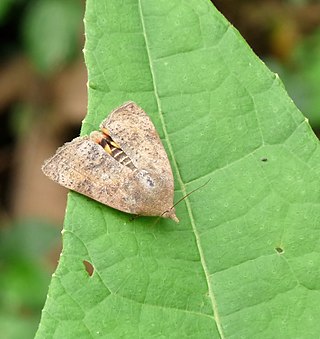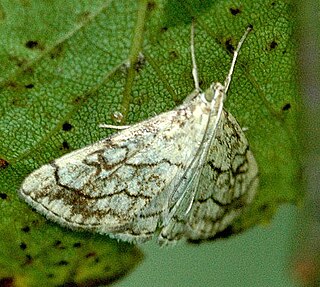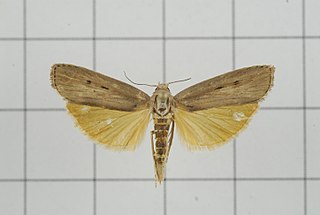
Crambidae comprises the grass moth family of lepidopterans. They are variable in appearance, with the nominal subfamily Crambinae taking up closely folded postures on grass stems where they are inconspicuous, while other subfamilies include brightly coloured and patterned insects that rest in wing-spread attitudes.

The Pyralidae, commonly called pyralid moths, snout moths or grass moths, are a family of Lepidoptera in the ditrysian superfamily Pyraloidea. In many classifications, the grass moths (Crambidae) are included in the Pyralidae as a subfamily, making the combined group one of the largest families in the Lepidoptera. The latest review by Eugene G. Munroe and Maria Alma Solis retain the Crambidae as a full family of Pyraloidea.

The Pyraloidea are a moth superfamily containing about 16,000 described species worldwide, and probably at least as many more remain to be described. They are generally fairly small moths, and as such, they have been traditionally associated with the paraphyletic Microlepidoptera.

Achille Guenée was a French lawyer and entomologist.

Hyblaeidae are the "teak moths", a family of insects in the Lepidopteran order. The two genera with about 18 species make up one of the two families of the Hyblaeoidea superfamily, which in the past has been included in the Pyraloidea. Recent phylogenetic studies find varying relationships of Hyblaeoidea among Ditrysian Lepidoptera: Mutanen et al. (2010) find the superfamily to group either with Pyraloidea, or – more often – with Thyridoidea or butterflies. The results of Wahlberg et al. (2013) and Heikilä et al. (2015) indicate a sister-group relationship with Pyraloidea.

Spilomelinae is a very species-rich subfamily of the lepidopteran family Crambidae, the crambid snout moths. With 4,135 described species in 344 genera worldwide, it is the most speciose group among pyraloids.

Evergestis pallidata is a species of moth of the family Crambidae described by Johann Siegfried Hufnagel in 1811. It is found in Europe, across the Palearctic and in North America.

In biological taxonomy, circumscription is the content of a taxon, that is, the delimitation of which subordinate taxa are parts of that taxon. For example, if we determine that species X, Y, and Z belong in genus A, and species T, U, V, and W belong in genus B, those are our circumscriptions of those two genera. Another systematist might determine that T, U, V, W, X, Y, and Z all belong in genus A. Agreement on circumscriptions is not governed by the Codes of Zoological or Botanical Nomenclature, and must be reached by scientific consensus.

Agrotera is a genus of snout moths in the subfamily Spilomelinae of the family Crambidae. It is the type genus of the tribe Agroterini and currently comprises 28 species distributed in the Afrotropical, Palearctic, Indomalayan and Australasian realm.

Evergestis is a genus of moths of the family Crambidae described by Jacob Hübner in 1825. A number of species are pests, including the cross-striped cabbageworm, a pest of cole crops such as cabbage.

Micromartinia is a genus of moths in the family Crambidae. It contains only one species, Micromartinia mnemusalis, which is found in Costa Rica, Brazil, French Guiana and Venezuela.

Udea is a genus of snout moths in the subfamily Spilomelinae of the family Crambidae. The genus was erected by Achille Guenée in 1845. The currently known 216 species are present on all continents except Antarctica. About 41 species are native to Hawaii.

The Anerastiini are a tribe of moths of the family Pyralidae.

Oxybia is a monotypic snout moth genus described by Hans Rebel in 1901. Its only species, Oxybia transversella, was described by Philogène Auguste Joseph Duponchel in 1836. It is found in southern Europe and on the Canary Islands.

Platytes cerussella is a species of moth in the family Crambidae. It is found in almost all of Europe.

Tirathaba mundella, the oil palm bunch moth, is a species of snout moth. It is found in Malaysia.

Glaphyriinae is a subfamily of the lepidopteran family Crambidae. It was described by William Trowbridge Merrifield Forbes in 1923. The subfamily currently comprises 509 species in 75 genera.

Scopariinae is a subfamily of the lepidopteran family Crambidae. The subfamily was described by Achille Guenée in 1854.

Lineodini is a tribe of the species-rich subfamily Spilomelinae in the snout moth family Crambidae.

Asciodini is a tribe of the species-rich subfamily Spilomelinae in the pyraloid moth family Crambidae. The tribe was erected by Richard Mally, James E. Hayden, Christoph Neinhuis, Bjarte H. Jordal and Matthias Nuss in 2019.

















